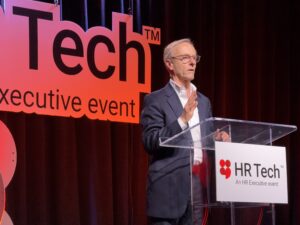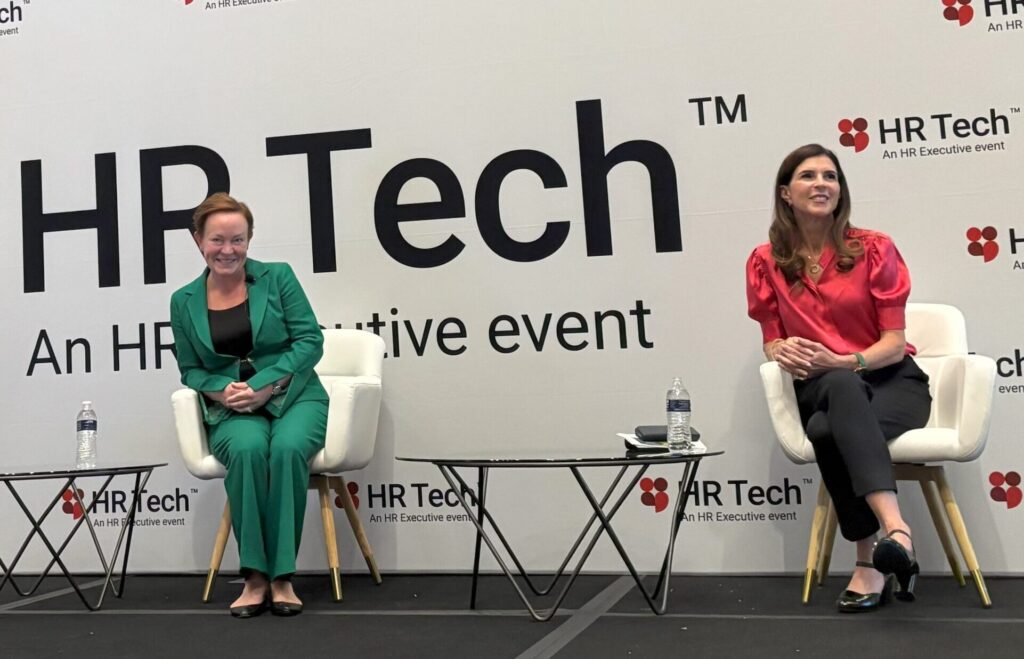The 2025 HR Tech convention in Las Vegas introduced collectively hundreds of HR leaders, know-how suppliers and consultants to deal with a urgent query: How can organizations adapt their folks methods to maintain tempo with speedy adjustments in work, know-how and worker expectations?
All through three days of keynotes, panels and private discussions, one message was clear: To remain aggressive, organizations have to take an intentional, strategic method to how they use know-how and information to assist their workforce.
5 precedence areas emerged as crucial for HR groups to deal with within the yr forward. These imperatives provide sensible steering for HR leaders trying to modernize their practices and construct extra agile, resilient organizations.
In response to many consultants at HR Tech, HR leaders should keep away from making use of know-how Band-Aids to damaged processes, as AI will solely serve to amplify bancrupt practices and information. As Mercer’s Jason Averbook powerfully articulated, “Digital transformation will not be about placing lipstick on a pig. It’s about essentially rethinking how we function.” Organizations can now not afford to overlay digital options on analog pondering and count on transformative outcomes.

This shift calls for a elementary reset in how HR approaches change administration, a subject that many audio system stated needs to be a prime precedence for leaders. The normal project-based transformation mannequin, with its outlined timelines and finite endpoints, should evolve right into a steady, perpetual-beta mindset.
HR on the helm
Many consultants on the convention stated that HR leaders can now not afford to attend for IT departments to drive change. As an alternative, they have to develop the company and functionality to steer well timed transformations that maintain tempo with enterprise wants.
The implications of how HR leaders place themselves in enterprise know-how initiatives may very well be profound. Organizations that proceed to automate damaged processes or implement new programs with out addressing underlying cultural and operational points will discover themselves with costly digital options that ship minimal worth, based on on-stage messages all through the convention. A number of consultants predicted that the organizations that can thrive are these prepared to query elementary assumptions about how work will get completed and the way know-how can allow higher outcomes.
Learn extra | AI in HR at IBM: Classes discovered, from the CHRO
2. Belief as the inspiration
Belief has all the time been a cornerstone of efficient HR operations, with payroll serving as probably the most crucial capabilities for constructing or destroying belief. In any case, above all else, most staff go to work to earn a paycheck. Pim Altena, a common supervisor at international employment agency Distant, emphasised this actuality: “Belief in payroll is non-negotiable. One mistake can undo years of confidence.”
Nevertheless, the significance of belief extends far past payroll accuracy. In response to a report from Nice Place To Work, a UKG firm, high-trust workplaces ship measurable and extremely sought-after enterprise outcomes. These embrace increased income per worker, elevated organizational adaptability, enhanced innovation and better discretionary affect from staff. As Sarah Hodges, chief advertising officer at UKG, famous, “Belief is the foreign money of high-performing organizations.”
After every week on the convention, it’s clear that know-how should assist this trust-building crucial by user-centric design and cultural alignment.
HR tech ought to ‘improve tradition’

IBM CHRO and opening keynoter Nickle LaMoreaux reminded attendees that “know-how ought to improve tradition, not masks its flaws.” This implies avoiding the temptation to automate damaged processes and as an alternative specializing in creating seamless experiences that reinforce organizational values and construct worker confidence.
Analysis printed earlier this yr within the Journal of Administration Research discovered that when staff belief that programs will work as promised, they’re extra prone to embrace new applied sciences, interact with growth alternatives and contribute discretionary effort to organizational targets. Conversely, programs that fail staff in primary methods create skepticism that undermines even probably the most well-intentioned transformation efforts.
Learn extra: Is ‘constructive disruption’ the important thing to navigating speedy change?
3. Human-centered AI adoption
Synthetic intelligence dominated discussions, however probably the most compelling insights targeted on the human-led footing wanted to harness AI’s potential.
Nat Natarajan, chief working officer at employment platform G-P, provided the viewers a relatable perspective: “Consider AI as your intern—useful, however needing steering.” This analogy captures the truth that AI instruments can course of info and counsel options, however human judgment stays important for conveying the enterprise context, rooting selections in moral foundations and driving strategic decision-making.
Robin Barbacane, chief expertise growth officer at Rackspace Know-how, warned her viewers towards the pitfalls of unchecked AI implementation: “AI with out human oversight is a recipe for threat.” All through the convention, different audio system echoed her concern that AI programs can amplify current biases, make suggestions based mostly on incomplete information or produce outcomes that appear logical algorithmically however fail in real-world purposes.
Profitable AI rollouts in observe
Whereas some panelists referenced analysis on “failed” AI implementation, others identified the flip aspect—probably the most profitable AI adoption methods share a number of traits. Insights from a number of consultants revealed that successful AI plans sometimes:
- Give attention to constructing AI literacy throughout the group slightly than concentrating experience in a small technical staff;
- Begin with low-risk purposes and progressively develop to extra crucial capabilities as confidence and competence develop;
- Keep steady monitoring for bias, accuracy and unintended penalties; and
- Protect human area experience as a aggressive benefit.
Whereas AI can determine patterns and course of huge quantities of knowledge, human consultants stay important for decoding outcomes, understanding context and making nuanced selections that take into account components past what algorithms can seize.
Organizations are discovering that the important thing to AI success lies not in changing human judgment, however in augmenting it, an idea that was a recurring theme all through most of the classes. HR leaders had been suggested to keep away from FOMO-driven implementations and as an alternative deal with fixing particular issues the place AI’s strengths align with real enterprise wants.
Learn extra: What are the important thing findings of the 2025 Annual HR Programs Survey?
4. Abilities as strategic foreign money
Organizations ought to take into consideration progress and functionality constructing, as an alternative of focusing solely on headcount enlargement, based on a number of audio system. Ahead-thinking corporations are prioritizing workforce productiveness and expertise growth in a approach that Kathi Enderes of The Josh Bersin Firm utilized a memorable shorthand: “Abilities are the brand new foreign money of productiveness.”
Many skills-based workforce transitions are pushed by financial realities and shifting workforce dynamics, and a number of other consultants at HR Tech stated they consider that developments in AI might assist deal with these challenges. With expertise acquisition prices rising and expert staff more and more selective about alternatives, some consultants suggested that growing current staff typically delivers higher returns than aggressive hiring methods. In reality, analysis from McKinsey reveals that employers lose, on common, greater than $50,000 when changing a full-time worker.

AI-powered studying programs are accelerating skills-based worker growth by making personalised studying scalable throughout giant organizations.
Nevertheless, as HR Tech keynote speaker Josh Bersin defined, “Studying should resolve issues, not simply examine containers.” Immediately’s rising HR know-how allows new approaches, however success relies on connecting growth on to enterprise outcomes and worker wants.
Driving outcomes with studying
Organizations are discovering that spectacular studying know-how means little if it doesn’t lead to improved efficiency, elevated engagement or enhanced functionality to satisfy enterprise challenges. In a dialog with HR Government, Apratim Purakayastha, Skillsoft’s common supervisor of expertise growth options, strengthened this level: “AI-powered studying is just precious when it drives outcomes.”
The implications lengthen to how organizations construction profession growth, based on a number of audio system. Conventional development fashions based mostly on tenure and hierarchical development are extra continuously giving option to versatile pathways that emphasize ability acquisition, lateral motion and steady adaptation to altering necessities.
As IBM’s LaMoreaux said, “[HR leaders] should redesign entry-level roles to replicate the way forward for work.” She stated this implies creating roles that put together staff for careers that can evolve repeatedly slightly than comply with predictable patterns.
Learn extra: The place Josh Bersin thinks AI transformation is basically headed
5. Knowledge, ecosystems and aligned imaginative and prescient
One strategic crucial addresses a problem that has lengthy pissed off HR leaders: the fragmentation of individuals information throughout a number of programs and the ensuing lack of ability to grasp the whole worker expertise.
Josh Gosliner, vice chairman of product technique at SAP SuccessFactors, circled the important drawback: “Disconnected information results in disconnected selections.” He stated organizations are making vital workforce investments based mostly on incomplete info as a result of their information exists in silos that don’t talk with one another.
Sahana Mukherjee, a world HR chief at Citigroup, strengthened this level: “Built-in information is the inspiration of strategic HR.” She stated that with out complete visibility into the worker expertise, organizations wrestle to determine issues, measure progress or make knowledgeable selections about their most vital funding: their folks.
The problem has tentacles that reach past technical integration into strategic alignment. Many organizations wrestle with level resolution proliferation, trying to unravel particular person HR challenges with separate software program instruments with out contemplating broader ecosystem implications.
Lengthy-term resolution or a fast repair?
In a briefing with HR Government, Alan Segal, chief digital and know-how officer at expertise agency AMS, cautioned towards prioritizing pace over strategic issues: “Pace is vital, however not at the price of compliance.” He says organizations that rush to implement options with out contemplating safety, scalability or regulatory necessities typically discover that fast fixes develop into costly issues.
Altena of Distant added one other essential consideration, describing how “hidden prices in tech can derail transformation.” The preliminary software program funding represents solely a fraction of the overall price of possession, based on Altena. Integration, coaching, upkeep and eventual substitute prices typically exceed unique budgets and timelines. HR leaders should request visibility into these components from distributors earlier than implementing a brand new know-how.
Citigroup’s Mukherjee stated probably the most profitable organizations method HR know-how as an ecosystem slightly than a set of particular person instruments. They prioritize integration capabilities, plan for long-term scalability and keep governance frameworks that stop technological fragmentation.

Maybe most significantly, high-performing organizations lead with technique slightly than know-how. Kelley Steven-Waiss, chief transformation officer at ServiceNow, noticed that “tradition shifts when staff see the profit.”
Tech implementations succeed once they resolve issues that staff expertise, stated Steven-Waiss, not once they showcase options that add complexity with out worth.
Business analyst and founding father of Valoir, Rebecca Wettemann, provided an important strategic perception that applies to many factors made throughout the convention: “Technique should lead, know-how should comply with.” The important thing takeaway is that organizations ought to begin with clear targets and work ahead to determine applicable know-how options.



